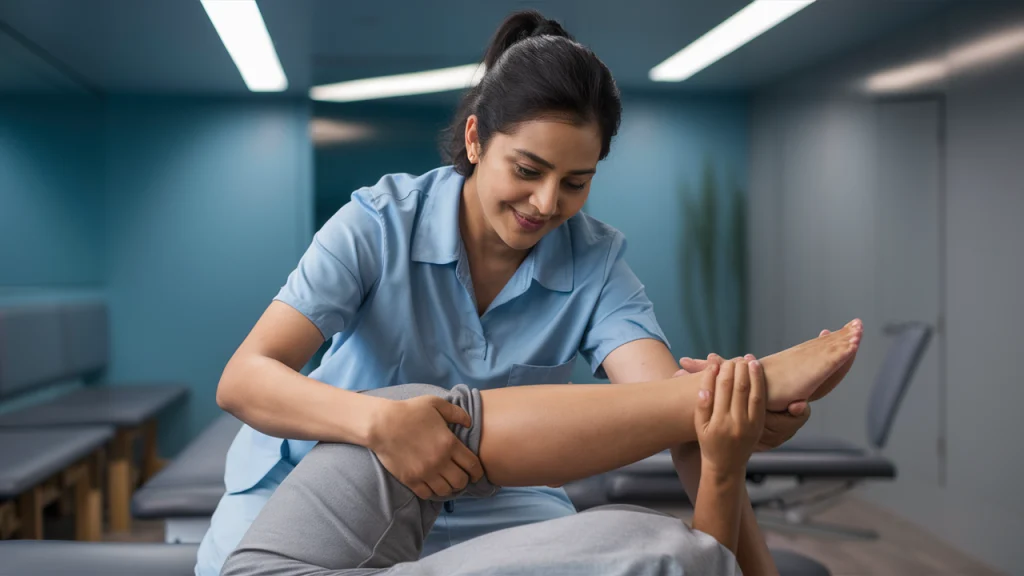As a leading physiotherapist in Ahmedabad, I often encounter patients with haemophilia, a rare genetic disorder affecting the blood’s ability to clot. This condition can lead to prolonged bleeding after injuries or surgeries and spontaneous bleeding into joints and muscles. My goal at Dr. Unnati’s Physio Clinic in Gota is to help individuals with haemophilia maintain joint function, reduce pain, and improve their overall quality of life through tailored physiotherapy in haemophilia treatments.
Table of Contents
Understanding Haemophilia and Its Impact
Haemophilia primarily affects the musculoskeletal system. Individuals with haemophilia are prone to bleeding into their joints, especially the knees, elbows, and ankles. This frequent bleeding can lead to chronic joint damage, resulting in arthritis and a limited range of motion. Understanding the mechanics of haemophilia is crucial in providing effective physiotherapy.
The Role of Physiotherapy in Haemophilia Management
Physiotherapy is a cornerstone of haemophilia management, focusing on several critical areas to improve patient outcomes. Here’s how we address each aspect at Dr. Unnati’s Physio Clinic:
Joint Protection
Proper joint alignment and body mechanics are essential to prevent joint damage and reduce bleeding risks. We educate patients on optimizing their movements and using supportive devices when necessary to protect their joints effectively.
Range of Motion and Flexibility
Maintaining and improving joint flexibility is crucial for preventing contractures (permanent tightening of muscles, tendons, or skin that restricts movement) and enhancing overall mobility. We design specific exercises and stretching routines tailored to each patient’s needs to keep their joints flexible and functional.
Strength Training
Strengthening the muscles around the joints helps stabilize them, reducing the risk of bleeding. Our personalized strength training programs focus on building muscle support to protect the joints and improve overall joint function.
Pain Management
Managing pain is a significant aspect of haemophilia care. We use various modalities, such as cold and heat therapy, ultrasound, and soft tissue mobilization, to address and alleviate pain effectively. These treatments help reduce inflammation, promote healing, and enhance patient comfort.
Education and Lifestyle Modification
Educating patients on preventing injuries and joint bleeds in their daily activities is a key component of our approach. We emphasize the importance of regular physical activity, proper posture, and safe movement techniques. Patients learn how to incorporate these practices into their daily routines to minimize risks and enhance their quality of life.
Functional Rehabilitation
For patients who have experienced musculoskeletal bleeding, our focus is on rehabilitation to restore functional independence and improve their quality of life. We develop comprehensive rehabilitation plans tailored to each patient’s needs, incorporating exercises and therapies that promote healing and regain lost function.

Benefits of Physiotherapy for Haemophilia Patients
Physiotherapy offers numerous benefits for individuals with haemophilia, significantly enhancing their quality of life. Here’s how physiotherapy can help:
Reduced Joint Pain
Physiotherapy interventions, including cold and heat therapy, ultrasound, and soft tissue mobilization, can alleviate joint pain, providing much-needed relief and improving overall comfort for patients with haemophilia.
Prevention of Joint Damage
Through targeted exercises and education, physiotherapy helps minimize the risk of joint bleeds and subsequent damage. Strengthening muscles around the joints offers added protection, reducing the likelihood of bleeding episodes.
Improved Mobility
Physiotherapy aims to enhance range of motion and flexibility, allowing individuals with haemophilia to maintain better mobility and functionality. Stretching routines and mobility exercises prevent contractures, ensuring joints remain flexible and functional.
Enhanced Strength
Strengthening exercises are crucial in improving muscle support around the joints. This added support helps stabilize the joints, reducing the risk of bleeds and the impact of joint damage. Stronger muscles can better absorb shocks and stresses, protecting joints during physical activities.
Physiotherapy is a vital component of haemophilia management, promoting joint health and enhancing overall well-being. At Dr Unnati’s Physio Clinic, we are committed to providing comprehensive physiotherapy care, empowering individuals with haemophilia to lead active, fulfilling lives. Through personalized exercise programs, pain management techniques, and education, we help our patients manage their condition effectively and improve their quality of life.

Dr Unnati Shah, BPT, MIAP, GSCPT, is a highly experienced physiotherapist with over 15 years of dedicated practice in the field. As the founder of Dr Unnati’s Physio Clinic in Gota, Ahmedabad, she specializes in treating a wide range of conditions, including sports injuries, orthopaedic issues, and chronic pain.